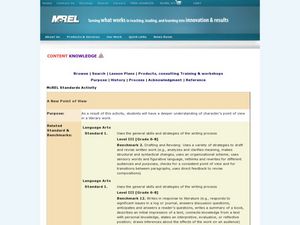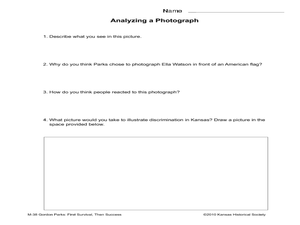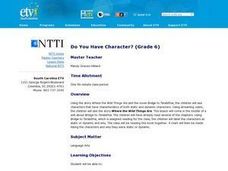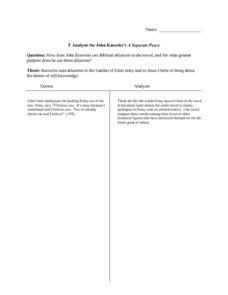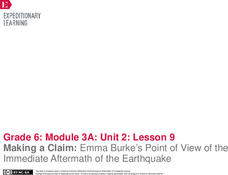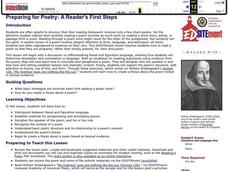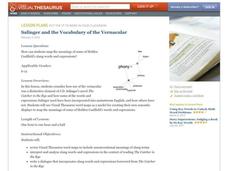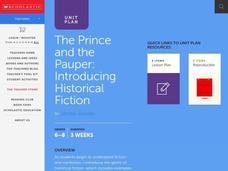Curated OER
A New Point of View
Analyze point of view and how it affects a literary work with this lesson. Middle schoolers create a written piece that focuses on point of view. They review the literary term "point of view," and explore examples of the term in text....
Curated OER
Moby Dick Puppetry
Such an ambitious lesson plan! Third graders with special needs listen to an audio recording of the novel, Moby Dick. They stop often to discuss each of the main characters and analyze their actions in the story. They then make puppets...
Curated OER
Gordon Parks:First Survival, Then Success
Have your class examine the work of Gordan Parks. They determine how Park's childhood in Kansas inspired his artwork as they analyze his writings and photographs. Students complete the provided worksheets as they compare, contrast, and...
National Endowment for the Humanities
Upton Sinclair, Theodore Roosevelt, and Harvey W. Wiley
Though Upton Sinclair's novel The Jungle shocked the American public into a thorough examination of the meat-packing industry, the author was disappointed that his book's main argument—the exploitation of American immigrants—was not...
Curated OER
What a Character!
Guide your readers to explore character traits. As a class, discuss and record the traits of a commonly-known fairy tale character. Then do the same with the main character in the class novel. Finally, have learners use magazines...
Curated OER
Do You Have Character?
Sixth graders read Katherine Paterson's novel, Bridge to Terabithia, and watch a video of Maurice Sendak's book, Where the Wild Things Are. They examine the characters in both stories that share similar characteristics. Students use the...
Curated OER
A Separate Peace - T Analysis
Reading A Separate Peace? Readers analyze important quotes that appear in John Knowle's classic novel using the provided graphic organizer. Learners record a passage and provide an accompanying analysis for each entry. Consider...
Curated OER
Painting Places with Words Using John Steinbeck's Of Mice and Men
Useful in an Of Mice and Men unit, or in a unit that focuses on descriptive writing, this lesson prompts young authors to impersonate John Steinbeck's writing style in the opening passages of the novel. A Six Trait writing activity...
PBS
Myth of the West: Kit Carson to the Rescue
There's nothing like the Wild Wild West! Scholars investigate the American Frontier through the eyes of Kit Carson. To complete the first installment of a three-part series, they use presentations, a short video, and primary and...
EngageNY
Making a Claim: Emma Burke’s Point of View of the Immediate Aftermath of the Earthquake
Sharpen those pencils; it's time to write! Scholars begin writing the first body paragraph of their literary analysis essays. Additionally, pupils use graphic organizers to analyze a character's point of view from Laurence Yep's...
San Francisco Symphony
By the Great Horn Spoon!
By The Great Horn Spoon is a fantastic novel for introducing learners to life during the California Gold Rush. First, kids research and analyze American folk songs, then they connect to the text as they listen to symphonic pieces written...
Curated OER
Preparing for Poetry: A Reader's First Steps
Learners examine denotation and connotation in language, and paraphrase a poem. They read and analyze a sonnet by iam Shakespeare, analyze the attitude and tone, paraphrase a poem, and create a thesis about a poem based on textual evidence.
Curated OER
Lifestyles of Civil War
Eighth graders, after viewing a website on Civil War Time, explore and analyze the lifestyles of Civil War times as well as those of the soldiers through the writing of a composition of a narrative letter and story through the eyes of a...
Curated OER
Salinger and the Vocabulary of the Vernacular
Writers explore vocabulary and expressions used in the English language. They use visual word maps to become aware of the different uses of words which will allow them to more readily interpret texts. Then they listen to/read excerpts...
Curated OER
Lesson: Urs Fischer: Your Choice: Reality or Illusion?
Young analysts write a comparative essay, but about what? They compose a paper based on several critical discussion about reality and illusion, and how both are blurred in art. They analyze several theatre pieces that exemplify Brechtian...
Curated OER
Looking at Portraits: Literary Monuments
Examine artwork, research literature, and create art pieces for a monument to a literary figure. Young scholars analyze the sculpture Model for a Monument to Alexandre Dumas père and compare it to other well-known monuments. They...
Curated OER
Calorie Calculations through Beach Activities
Beach activity separates babes from blobs! Your class learns about calculating the number of calories used during physical activity. A worksheet is provided in which the activity of five different people at the beach is listed for...
Maryland Department of Education
The Concept of Identity Lesson 8: Propaganda in Visual Media
Visual and print propaganda are featured in a instructional activity that asks readers of A Separate Peace to examine the techniques used in propaganda from World War I, World War II, presidential elections, and in the novel.
Maryland Department of Education
The Concept of Identity Lesson 4: The Psychological Approach
Readers apply Sigmund Freud's theories of the unconscious mind and the psychological approach to literary criticism to analyze and evaluate the relationship between two characters in A Separate Peace.
National Endowment for the Humanities
Shakespeare's Macbeth: Fear and the "Dagger of the Mind"
High schoolers read and analyze Shakespeare's play, 'Macbeth.' They analyze how Shakespeare uses metaphors, imagery and dramatic cues to demonstrate Macbeth's response to fear, and perform without words a scene dramatizing Macbeth's...
Curated OER
"Shooting An Elephant": George Orwell's Essay on His Life in Burma
High school readers examine George Orwell's essay "Shooting an Elephant" for examples of symbolism, metaphor, connotation, and irony. They analyze how these literary tools convey the writer's main point and contribute to the persuasive...
Curated OER
The Prince and the Pauper
Mark Twain, the famous American author, is often studied in the school system. Use "The Prince and the Pauper" to analyze the differences between the text and its video version. This lesson includes several culminating project...
Alabama Department of Archives and History
Conflict in Alabama in the 1830s: Native Americans, Settlers, and Government
To better understand the Indian Removal Act of 1830, class members examine primary source documents including letters written by Alabama governors and the Cherokee chiefs. The activity is part of a unit on the expansion of the United...
EngageNY
End-Of-Unit 2 Assessment: On-Demand Analytical Essay About How Esperanza Changes Over Time
Close the unit on Esperanza Rising with an in-class analytic essay on how Esperanza changes over the course of the novel. Writers can use any of their notes and work from the unit as well as their drafts of the first two paragraphs of...
